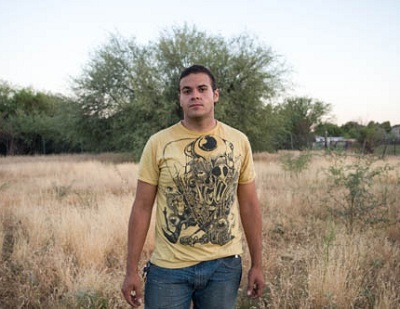"When I get remembered, it will not have been for busting up a bar fight or even kicking in doors in Fallujah. It'll be for choosing the right path when it could have been so much easier to go down the wrong path, to let myself get bogged down by feelings of insecurity or anxiety and, ultimately, let it kill me," Laurent Taillefer said recently.
But when Laurent returned home from Iraq, where he served with the Army's 118th Infantry, he was lost in a deep funk. "When I got out, I was so sure that I was going to have a short life that I even found jobs that would create that. The guy I replaced, back when I was a bouncer at a strip club, had been shot. And if I wanted to be honest with myself, I'd say I kind of expected myself to get shot."
Laurent had been injured in Iraq and had seen some horrifying things there, but what had shaken him the most was the death of his close friend, Soto. "My friend had died in Iraq, and I was torn up ... we spent every waking hour together..." he said. "Soto was larger than life. After he died, everything was temporary; everything was so close to the end."
Laurent sought the company of fellow veterans, but hanging out with them didn't help him.
"God, the worst day was, I went to a bar, I ran into a buddy of mine who I haven't seen since Germany," Laurent recalled. "The only thing that he wants to talk about is, 'Oh, did you hear about Hernandez. Yeah, Hernandez didn't make it.' And my response was to go home. I fell asleep. When someone woke me up, like, a day later, I got mad at them, got drunk, and slept for two days. I didn't leave the bedroom. So that's three total days gone because I ran into a battle buddy. I had a couple of friends who wanted to make believe that they were psychologists, and I thought that was helping me, at the time, to have them say, 'You don't need help, you're fine. You just -- come on, let's have a drink.' That's not psychologizing, that's not even helping."

Laurent needed a change, so he parted company with his friends.
"Once I separated myself from my friends, I was all alone," he said. "And then I needed somebody. And that's when I went into therapy. My psychologist recognized that my story about how I was blown up, by, you know, various land mines or getting shot at, that wasn't really what was bothering me. What was bothering me was survivor's guilt, where, for me, the shame is being alive. Not really that they died, but my continued existence is an affront to them. That's just your own mind playing tricks on you. Once my doctor got me to face that, I think that's really the turning point."
And Laurent's treatment, in turn, led to a dramatic change in attitude and, ultimately, a new path in life.
"I decided, if I am going to be alive and if Soto cannot be alive, then I'm going to have to do it for both of us," he said. "I'm going to have to live a long time, and I'm really going to have to make the most of it, the way Soto would have -- big. We are not just getting an associate's degree, no! We are getting a full bachelor's degree in exactly what we want to do, because we are going to be famous at it. If it takes forever to be the best writer, I will do that forever. Soto would want that for me."
For more information on PTSD and ways to raise awareness of this mental health problem during June and throughout the year, professionals and members of the public can visit the National Center for PTSD website, www.ptsd.va.gov/about/PTSD-awareness/. This site offers resources such as:
- PTSD Coach Online and the award-winning PTSD Coach mobile app, which provide self-help symptom-management tools. The app is always with you when you need it.
- PTSD Continuing Education opportunities for providers, including PTSD 101 Courses, on the best practices in PTSD treatment (CEs/CMEs offered).
- AboutFace: Online videos of Veterans talking about how PTSD treatment can turn your life around.
- For continued involvement, please subscribe to the PTSD Monthly Update. Stay up to date on new information about PTSD and trauma year round.